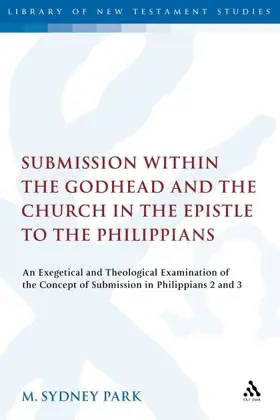

Submission within the Godhead and the Church in the Epistle to the Philippians: An Exegetical and Theological Examination of the Concept of Submission in Philippians 2 and 3
in Library of New Testament Studies
Pages
224
Publisher
T&T Clark
Published
8/21/2007
ISBN-13
9780567045515
While the notion of submission (particularly women's submission) has been the focus in not only biblical studies and feminist theology but also in church structure and in the wider context of modern Christian culture, little attention has been given to the theme academically.
Deviating from the general tendency to seek answers to the issue of women's submission from creation accounts, this research focuses on Philippians 2:6-11 as the primary text and reason for embracing submission as the defining characteristic of a Christian community. The argument for submission is thus based on soteriology and ethics of the cross rather than creation. Thus, submission is an integral notion not only for women but all Christians.
In this way, the rights language of feminist theology is addressed as well as the claims to male headship which reflect a concern for the right to rule rather than that of Christ's self-sacrifice (submission) in Philippians 2:6-11. Both attempts to attain power and retain power stand in direct opposition to the image of Christ in Philippians 2:6-11. Simultaneously, the notion of submission does not preclude equality or even authority: all three are present in Philippians 2:6-11. Christ voluntarily submits out of his equality with God and later is endowed with God's own authority in 2:9-11.
This study shows that the three notions of submission, equality and authority are not as neatly compartmentalized as many assume.
Deviating from the general tendency to seek answers to the issue of women's submission from creation accounts, this research focuses on Philippians 2:6-11 as the primary text and reason for embracing submission as the defining characteristic of a Christian community. The argument for submission is thus based on soteriology and ethics of the cross rather than creation. Thus, submission is an integral notion not only for women but all Christians.
In this way, the rights language of feminist theology is addressed as well as the claims to male headship which reflect a concern for the right to rule rather than that of Christ's self-sacrifice (submission) in Philippians 2:6-11. Both attempts to attain power and retain power stand in direct opposition to the image of Christ in Philippians 2:6-11. Simultaneously, the notion of submission does not preclude equality or even authority: all three are present in Philippians 2:6-11. Christ voluntarily submits out of his equality with God and later is endowed with God's own authority in 2:9-11.
This study shows that the three notions of submission, equality and authority are not as neatly compartmentalized as many assume.
- Table of Contents
- Chapter 1: Philippians 2:5-11
- Chapter 2: Exegesis of Philippians 3
- Chapter 3: Mimesis and Power
- Chapter 4: Submission in Philippians
- Chapter 5: Feminist Theology
- Conclusion